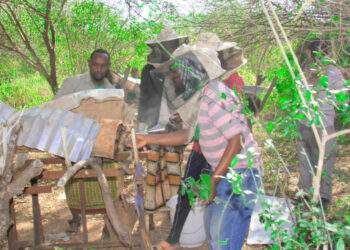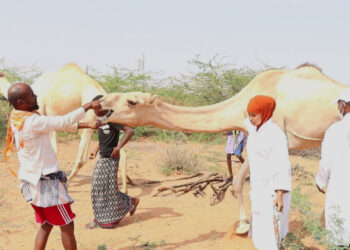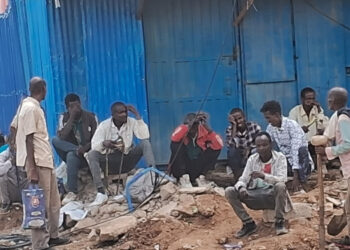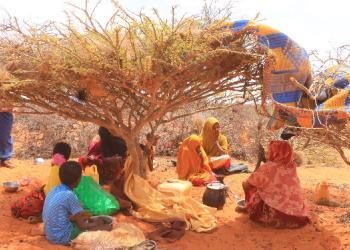(ERGO) – Shamsa Hassan Jimale arrived in the Dadaab refugee camps in northern Kenya in 1992 after the onset of the Somali civil war with few possessions, among them her curtains from their house in Kismayo.
She sold the curtains for 300 shillings and bought a goat that she sold for meat. So began her business, which more than 30 years later comprises of 11 butchery shops selling camel and goat meat. The business provides jobs and opportunities for 72 other refugee women and 48 men.
Shamsa, 59, lives in Hagadera camp with her husband and eight children. Her business includes slaughter of animals and supply of meat to small scale retailers, mainly women, across the refugee camp complex. She allows the women to take the meat from her on credit.
“The women are the most vulnerable people in the camp, I normally don’t have other interests besides helping them,” Shamsa said.
“Some of them come to me and tell me the children are out of school because they couldn’t afford books or even food. When they tell me this I ask them if they can work, and I get to them to join the meat business.”
Having gone through similar challenges all those years ago, says she understands the plight of destitute refugees struggling to raise their children in the conditions of the camp.
Fadumo Osman is one of the women who relies on supplies of meat from Shamsa for her butchery table in the camp. Every morning, Fadumo gets meat on credit from one of Shamsa’s shops and after selling it she pays back her debt and remains with about $3 profit.
Fadumo sets aside some of the meat for her family’s consumption. She also receives 48 kilograms of sorghum, five litres of cooking oil, and 4,050 Kenya shillings in cash aid per month from aid organisations. Her family now enjoys all three meals in a day.
“Our lives today are better; we have a decent living. I take the meat in the morning and sell it in small portions each for about 20 or 30 shillings,” she said.
Fadumo joined the refugee camp in 2008 after fleeing insecurity in Somalia. As a single mother it has been hard raising her children alone in Hagardera camp. Three of her children get free primary education in the camp.
She used to take on domestic work for families in the camp but the income was poor and irregular.
“Whenever we had no food, I would try to keep the children busy so that they didn’t roam around the camp. I’d put some water on the fire and they would ask me what I was cooking for them, I would tell them to wait and they would end up asleep,” she said, remembering the hard days before she started her meat sales.
Halimo Omar Arbo, 24, also gets supplies from Shamsa for the small meat stall she set up five months ago. She earns a daily average of 300 shillings, which has been crucial for her and her three children.
“I can feel the difference in our lives, thank God she’s given me an opportunity, I’m no longer faced with food shortage and she helps me! I depend on the meat and that is how to get by,” Halimo said.
Halimo came to Dadaab in 2013 after feeling prolonged drought in Jilib area in Middle Juba region of Somalia. They had often lived on one meal a day as she was making irregular income from house-keeping jobs.











